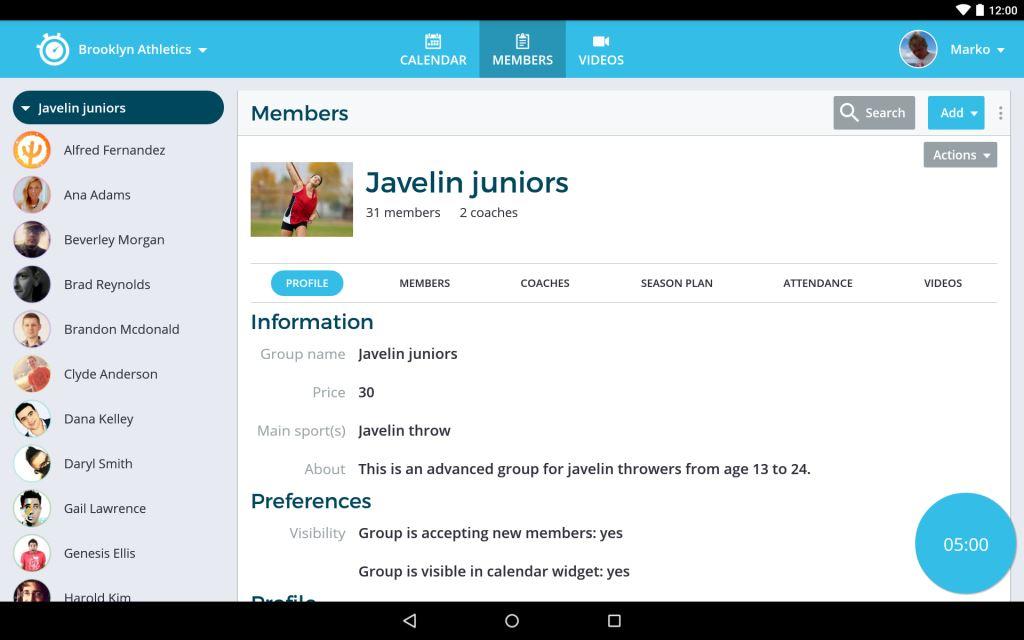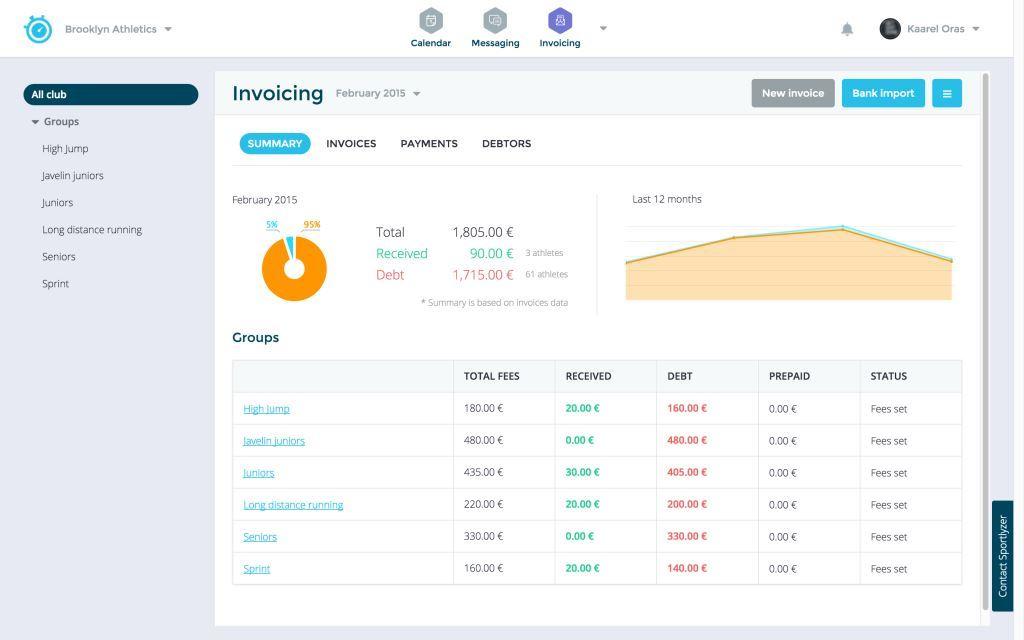In Startup Spotlight, we zoom in on numerous Estonian startups, to find out more about their business model and how they operate. This time we’re featuring Sportlyzer, an all-in-one sports team management software for sports clubs to automate their everyday tasks and concentrate on building an efficient sports club.
We spoke with the company’s founder and CEO, Tõnis Saag, about what they do and how they are helping sports clubs with long-term athlete development.
How did the idea of starting your business come about?
Before starting with Sportlyzer I co-founded and managed sports medicine functional testing labs in Estonia, a logical continuation to my athletic career and working as a coach. Although the business had been growing steadily, during the economic recession sales went badly down. We were offering quite expensive service with substantial initial investment to a very small market, and for our customers (sports clubs, recreational athletes) it was one of the first things to cut from their expenses when budgets got tighter. So, I was desperate to find new angles that would not only make this business viable, but also cheaper and easily scalable, because as a former athlete I was intuitively looking for ambitious goals. Every way I looked at it, the best way to scale out from Estonia seemed to be software. I started to develop the idea and the project was starting to live its own life. Already aware of that sitting on too many chairs hurts, I stepped out of my other businesses and focused on building Sportlyzer. Hence, Sportlyzer was born from my personal past in sports, my need to reinvent my sports medicine business and my desire to achieve something great in business.
What would you say was the hardest part of starting the business?
Everyone who has started a business knows that finding an idea, figuring out the potential business model, establishing a company and hiring people are the easiest baby steps. The real work starts when you have reached the so-called valley of death – the time when your company is not growing fast enough yet and you’re running out of money. This is the time when you have very little time to figure out the actual product, market and business model, keep the team together, and convince everyone that you know what you are doing. Luckily, your team is still small enough to make miracles happen incredibly fast. So, this is also the moment of truth – how good have you been at choosing the people around you and how tough you all are.
How were you able to fund the business?
When I started looking for technical co-founders to start the IT business, I wasn’t thinking of raising investment. On the contrary, I didn’t even know the term “venture capital” and I planned to start by bootstrapping. But everything kind of happened as a chain reaction – I partnered with the Estonian startup entrepreneur, Jüri Kaljundi (Weekdone), and his team, asked for feedback from a guy I knew – Ott Pärna, who happened to be the head of the Estonian Development Fund, and then we already sat down with their portfolio manager, Andrus Oks, who is now our board member. We joined the incubator program of the Development Fund and started to develop the concept. Eventually, after I had met Rein Lemberpuu, the ex-CEO of Playtech Estonia, and he had interest to partner with me to develop the initial product, Estonian Development Fund also joined the seed round. Then, after three-four months of settling things and negotiating the contracts, the deal was done.
What was the minimum viable product (MVP) you built and if/how it has changed?
Sportlyzer has gone through quite a few changes. The initial idea was to develop a training management collaboration platform for coaches and athletes, but Sportlyzer was started as an automated training-planning engine for recreational endurance sports practitioners. After figuring out that despite it would be really cool technology it would be a lousy business, we pivoted Sportlyzer back to the initial idea of organizing training plans and data between athletes and coaches, and eventually expanded to a sports team management software platform.
What is your business model?
Our goal is to help overworked youth coaches in grassroots sports clubs lower their administrative overhead. Coaches, many of them volunteers contributing their free time, spend most of their time in sports venues with athletes. But besides that, they also need to plan and analyse training, keep membership lists up-to-date, report to government offices and federations, communicate with sports parents, organize competition trips, spend their weekends at competitions etc.
The all new Sportlyzer is a software platform for sports team management. The platform is designed as a virtual operating system. Free club membership management serves as the core functionality and all other features are divided into apps (free and priced) that can be switched on and off according to current needs.
There are apps for club managers (Calendar, Invoicing, Messaging etc.), apps for coaches (Planning, Analytics, Diary, Video etc.) and apps for athletes (Diary, Analytics, Tests etc), all of them plugged into the central membership database.
Another interesting aspect about Sportlyzer is that we are building a distribution network consisting of sports lifestylers and the former karate heavyweight champion, Marko Luhamaa, has just joined us to lead this process. Lifestylers are people passionate about their sport and usually highly personally networked in the sports community. To turn their passion into income, many of them are looking for related business opportunities. Sportlyzer offers them a possibility to do this by serving as affiliates and regional managers. The first pioneers who joined Sportlyzer range from former professional footballers to active cyclists and orienteering coaches with intricate knowledge of sports in their countries.
Cyril Amiot, the Area Manager of France, is a triathlete and a triathlon coach with a long career in sports companies. He partnered with Sportlyzer because he saw the value of the tools for himself as a coach. He said, “For me, the web and mobile apps are perfect tools to create training plans, follow athletes in real time, compare planned and completed volumes, and make quick changes if needed. As a result, I spend less time on the organisation and training planning, and I can give more to my athletes.”
How is your company different from other competing and similar platforms out there?
There are already many apps out there that solve certain problems in sports, but the problem is that they are not synced with each other. Sportlyzer provides different apps for club administration and training management, all of them plugged into the free-of-charge central membership database. According to their needs, clubs can switch apps on and off without losing any data. In the future we plan to open our API to anyone who needs to develop additional features or wants to sync their service with us.
As a result coaches will add the athletes to the system only once and then use any app with them without wasting additional time on synchronising lists in multiple solutions. As Marek Naaris, the coach and CEO of 450-strong football club FC Elva puts it: “We wanted to have all of our training analysis in one place and Sportlyzer is a good match for this. The biggest benefit for our club is to have all information in one system, accessed by whoever and wherever needs it.”
How has your market changed since you started? How has your business changed to keep pace?
As you can see above, these changes have not taken place because of the market changes, but rather because of the search for a scalable business model. But I can’t deny that we don’t benefit from the changes that technology has caused in the market – smartphones and tablets are actually the first digital devices that are practical enough to replace the paper clipboards and notebooks widely used by coaches. And as of today, these devices are cheap enough to be widely adopted by very practical and usually low budget grassroots sports people, which has removed the technological barrier from shifting sports club management from paper and Excel to a software platform.
Could you briefly describe the founding team and their background?
I am a previous karate athlete and coach, who founded and managed sports medicine centres in Estonia before I initiated Sportlyzer. I’m also a big fan of the long-term athlete development model, where sport is contextualised through different phases of life and development levels regardless of whether the practitioner is a recreational exerciser, amateur lifestyler, or an elite athlete. This philosophy has also filtered deeply into Sportlyzer’s vision.
Jüri Kaljundi, a co-founder and board member of Sportlyzer, is a serial startup entrepreneur, currently working on an employee progress-reporting platform Weekdone.com.
In later phases, the founding team was expanded by Indrek Altpere, Hanno Vene, Kaarel Oras, Jarek Mäestu, Aave Hannus. Indrek and Hanno are software engineers, Kaarel is a hard-boiled product manager, Jarek is a sports scientist and Aave a sports psychologist.
Where are you based and why?
The Sportlyzer headquarters is in Tartu, Estonia. This is where we live and at the moment we don’t see the need to go anywhere else. Of course, at a certain growth moment we’ll need to establish sales entities in business hotspots. Also, hiring huge IT teams is incredibly hard in small Estonia, but we’ll keep it this way until we’re small. Besides, Tartu is an affordable and cosy place to live and due to many universities it’s rich in talent.
Do you have governmental subsidy to operate your business?
Yes, Sportlyzer has received a couple of grants from Enterprise Estonia, is a research project partner in Enterprise Estonia funded ELIKO Technology Competence Centre, and is a partner in the Archimedes Foundation funded research project driven by the Institute of Technology of the University of Tartu.
What could you say has been some of the key things you’ve learned so far as an entrepreneur?
Too much planning is an intellectual hobby. Of course, nobody wants to go on a journey based on intuition only, but an over-reliance on the rational and the analytical can be just as dangerous. Your journey will be non-linear and your plan will expire in a week. Therefore, you need to adopt tools and methods that enable fast change of direction and be creative using them.
You need to focus on core things and combine “Better done than perfect” with “Devil is in the details”.
Someone has to be an arsehole from time to time and it’s probably me. The good thing is that others are usually thankful for me getting this shit done.
What is an average workday like for you?
My day is largely defined by my work and family. I wake up at around 6:40, take my smaller kid to the kindergarten and arrive at the office by around 8:40. The business hours usually consist of multitasking between meetings, my own tasks, and quick brainstorms. It’s pretty hard to find totally free time to focus on my own tasks – that’s why I leave my larger tasks for the night. Depending on our family schedule I leave between 17:40 and 20:30. Sports, shopping, dinner, and time with kids follows. After 22:00 I usually work for two-three more hours, sometimes longer. This is the quiet time when I can get my own tasks done. At weekends I work around four-five hours a day from home, do sports and spend time with my family.
What pieces of advice could you give to aspiring entrepreneurs out there looking to start their business?
- Be interested in things that others will love in five years – then your product will be timely.
- Choose your domain that you are expert in. Being a good engineer or a business prodigy is not enough. You need to know your market in depth to understand their problems, see possible solutions, and define the marketing language. In startups you can’t hire all these people, you need to do a lot on your own.
- Get a startup job before you start your own business – you will help others build their businesses and eventually you will build your own business much faster.
- Target at least a one billion market with a substantial untapped niche.
- Surround yourself with hard-working people smarter than you, because you will become the average of the five people surrounding you. And prepare to lead them – easier said than done.
- Narrow the scope and focus on priorities. Of course, in the beginning you feel that you can and have to do everything but trust me – soon you will be totally overloaded even with the narrowest task.
- Always run, make fast changes, make a lot of new mistakes, and leave less important things undone, because all your initial plans will fail, and time and money are running out fast.
- Take your startup as a marathon where you need to win every intermediate sprint.
- Learn something new every single day and call every day wasted when you didn’t.
- Ignore negative bashing. Some people just ego-boost themselves by belittling things they don’t understand, but they will never start anything new themselves.
Where do you see your business in five years’ time?
In five years, Sportlyzer will be the leading grassroots sports team management platform at least in Europe.
What trends, startups, technology are you personally looking forward to in 2015?
We can witness the emergence of the smart things and more and more software platforms getting in sync with each other. This is not a short process, but everyone will save a lot of time from this. At Sportlyzer, we are working hard to contribute to this process at least in the world of sports.





Good, balanced article. I have been following this company for a few years. They were founded in 2009, so it’s now been 6 years. Are they finally making money? Seems like the company was idle for a few years.
Can we get some numbers? Like clubs that use it? How much they made last year? ETC
Your questions are too logical and reasonable. Unfortunately EW articles usually aren’t written by trained journalists who would report on useful details like that.